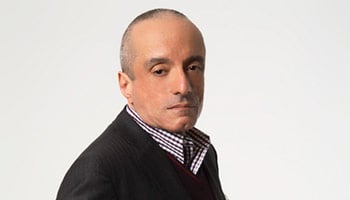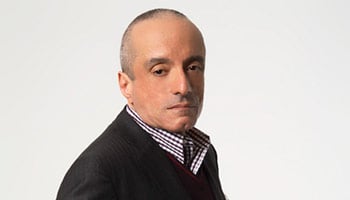a Social Justice Activist and Champion for Latinos Living with HIV/AIDS
New York, Monday, December 14, 2009 – The Latino Commission on AIDS mourns the passing of its founder, Dennis de Leon, a tireless advocate for social justice and one of the first openly HIV-positive Latino leaders in the country. He was a pioneer and a visionary, and in his lifetime he sought to curb and eliminate health disparities among marginalized communities. As a lawyer and later a non-profit executive, deLeon believed in bridging cultural differences to effect progressive social change.
 For 15 years, de Leon was the President of the Latino Commission on AIDS, a national service and advocacy organization addressing HIV/AIDS and health disparities in the Latino community nationwide. In his capacity as Commission President, de Leon served as the Manhattan delegate on the Civilian Complaint Review Board, which reviewed police misconduct allegations, and on several other boards, including the New York City HIV/AIDS Planning Group, Gay Men’s Health Crisis, Housing Works, and the Federal AIDS Policy Partnership.
For 15 years, de Leon was the President of the Latino Commission on AIDS, a national service and advocacy organization addressing HIV/AIDS and health disparities in the Latino community nationwide. In his capacity as Commission President, de Leon served as the Manhattan delegate on the Civilian Complaint Review Board, which reviewed police misconduct allegations, and on several other boards, including the New York City HIV/AIDS Planning Group, Gay Men’s Health Crisis, Housing Works, and the Federal AIDS Policy Partnership.
Prior to his tenure at the Commission, de Leon served as Chair/Commissioner for the New York City Commission on Human Rights, where he enforced human rights laws and increased cooperation between diverse ethnic and racial communities. From 1988 to 1990, he was appointed Deputy Borough President for Manhattan after six years as the city’s Senior Assistant Corporation Counsel, where he supervised civil rights law enforcement and the representation of uniformed officers.
“Dennis’ impact on the HIV epidemic will be felt for years and generations to come. Throughout his career and as President of the Commission he maintained that all communities of color needed to work together to address not only the disease but injustices that made our communities more vulnerable. His passing is cause for great sadness, but his life and legacy are a cause for celebration, stated Ruben Medina, Latino Commission on AIDS Board Chair.“ “He has touched millions of lives and made a tremendous difference in the world. “
“It will be a challenge to pick up the mantle Dennis has left for us at the Commission. Dennis was a friend, a mentor and an example of what a national leader should be. He is a testament to the human spirit and the power of perseverance. His work and his dedication to our community will not be forgotten, “stated Guillermo Chacon, Latino Commission on AIDS President.
“Dennis was a force to be reckoned with. If there was a social justice issue that needed to be addressed you knew you wanted Dennis on your side. His work and his voice were respected nationwide and there was no greater champion for Latinos living with or affected by HIV/AIDS. He will be greatly missed,” stated Ernesto Loperena, former Latino Commission on AIDS Board Chair.
For information about funeral services and the service for Dennis deLeon, please visit: www.latinoaids.org or call 646-375-4415
Biography of Dennis DeLeon
The Latino Commission on AIDS mourns the passing of its founder, Dennis deLeon, a tireless advocate for social justice and one of the first openly HIV-positive Latino leaders in the country. He was a pioneer and a visionary, and in his lifetime he sought to curb and eliminate health disparities among marginalized communities. As a lawyer and later a non-profit executive, deLeon believed in bridging cultural differences to effect progressive social change. He pushed lawmakers to consider community-based approaches to public health, and stressed increased accountability and responsiveness on the parts of government agencies. Throughout his career he maintained a vibrant concern for all people of color, especially those communities ravaged by the HIV/AIDS epidemic. His loss is the cause of great grief and sadness, yet his legacy is worthy of celebration.
Dennis deLeon was born in Los Angeles, California in 1948. He earned his B.A. from Occidental College in 1970, and became a lawyer in 1974 after attending Stanford Law School. His time in school was marked by leadership in undergraduate and law school organizations, including the Stanford Law Review. After clerking for a California appellate court judge, Dennis joined the Civil Division at the U.S. Department of Justice in Washington, D.C. as a trial attorney. During his tenure there he inaugurated one of the largest Latino employee organizations in the Department of Justice. Later, Dennis returned to California to work as Regional Counsel for California Rural Legal Assistance, where he provided legal services for migrant farmworkers in California’s agricultural communities.
It was in the early 1980s that Dennis sought to draw attention to the health disparities facing minority populations. In 1982, he was appointed to serve as Senior Assistant Corporation Counsel in the New York City Law Department. Four years later, deLeon was appointed by Mayor Edward I. Koch to serve as Executive Director for the Mayor’s Commission on Hispanic Concerns. The Hispanic Commission issued a report with far ranging recommendations for Latino New Yorkers. Worked with hundreds of Hispanic organizations in receiving testimony and recording numerous recommendations, Dennis drove a significant and unprecedented engine of social change in New York City, the ramifications of which are felt to this day. His visibility in the community lent credence and weight to his recommendations to elected leaders.
In 1988, deLeon was appointed to serve as Deputy Borough President for Manhattan, where he presided over land use and civil rights’ issues. When David Dinkins was elected New York City’s Mayor in 1990, he charged Deleon to serve as Director of Transition for a two month period, after which he served as Chair of the New York City Commission on Human Rights. Under deLeon’s leadership, the Commission on Human Rights assumed a new level of public advocacy for the rights of minority groups, spurring the creation of the Youth Commission on Human Rights, the Office of Mediation and Conflict Resolution, the Civil Rights Training Institute and the Bias Strike Force and Hotline. deLeon also intervened to address disputes in several communities, including those between Hasidic leaders and African-Americans in Crown Heights and Williamsburg, between Dominican-Americans and the police in Washington Heights, and between gays and Irish leaders in the St. Patrick’s Day March.
Dennis’ decades of civic work revealed a profound need for HIV prevention and education services for New York City’s emerging and diverse Latino population. In September 1994, deLeon became President of the Latino Commission on AIDS, where he headed a broad-based community effort to respond to the needs of Latinos infected with, and affected by, HIV. Dennis greatly expanded the relevance of the Commission, growing the organization from a one-person operation to a million dollar multi-service agency. Under his leadership the Commission developed a national clearinghouse for AIDS treatment information in Spanish, the first and largest network of religious leaders offering HIV prevention programs in Spanish-speaking congregations, and the National Latino AIDS Awareness Day which has been adopted by over 200 organizations in 38 states.
Dennis was the heart and soul of the Commission. Seeking to increase awareness on the wide-ranging impact of HIV, Dennis served on a variety of boards, including the New York City HIV/AIDS Planning Bodies, Gay Men’s Health Crisis, Housing Works, the Federal AIDS Policy Partnership, and the People of Color Coalition. Today, the Commission is a primary resource for elected officials, community-based organizations, government agencies, media, and religious groups looking at health disparities and interventions across racial and ethnic groups.
It is difficult to capture or summarize the breadth of Dennis’ impact on the HIV epidemic. It is impossible to measure or quantify his contributions to minority health. The Commission is devastated by Dennis’ loss, and yet will forge on in the direction of his vision, where someday we will all see an end to HIV. Dennis de Leon is survived by his partner of more than 30 years Bruce Kiernan.
Oscar Raul Lopez


